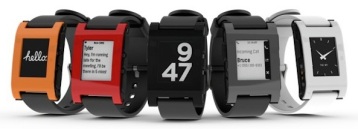 Fitbits and other “wearable electronic devices” have been around long enough to become a useful measuring device for heart rate, steps, and many other physical functions. These little watches are also transforming Parkinson’s care and research.
Fitbits and other “wearable electronic devices” have been around long enough to become a useful measuring device for heart rate, steps, and many other physical functions. These little watches are also transforming Parkinson’s care and research.
The traditional model of Parkinson’s care is visiting your neurologist every six months or so and reporting your symptoms. No matter how good a reporter you are, wouldn’t it be more accurate to have a daily objective record? Voila – a magic watch that records your symptoms.
For Parkinson’s research, researchers encounter the challenges of getting research subjects to accurately report symptoms on a timely basis — and to compare different patients’ symptoms in a database. Again — a magic watch.
Of course, making use of these magic watches is not so simple as slapping one on a Person with Parkinsons. There needs to be sophisticated software for accurate measurement, collection, and reporting, while still protecting privacy.
Apple has been winning kudos for an open source software framework called ResearchKit which facilitates creation of medical research apps using iPhone devices and wearable electronic devices. With this framework, developers don’t have to reinvent the wheel for common requirements (e.g., patient privacy) and can focus instead on their specific research. Although it was only launched in March 2015, the ResearchKit has already been used to facilitate research in autism, breast cancer, heart disease, and other medical challenges.
And what about Parkinson’s? A non-profit right here in Seattle called Sage Bionetworks is creating several apps using ResearchKit including one called Parkinson mPower study. Study objectives are to better understand why some people with PD have different symptoms than other people with PD, why a person’s symptoms and side effects can vary over time, and what can be done to help manage these differences in symptoms day to day. Twice a day (before and after meds), participants use the app to test tapping (tapping on objects as they flit across the screen is a way to test reflexes), walking/balance, voice (a soft voice is a classic PD symptom), and memory. In addition to these daily tests, participants answer periodic questions posed by the app such as: What made you feel better/ worse today? Michael J. Fox Foundation is a sponsor of the mPower app, along with Sage, Robert Wood Johnson Foundation, and Parkinson Net. So far, there have been over 10,000 participants (although oddly only 1,700 with PD). No big conclusions yet, but Sage did find out that the daily task results varied consistently with 80% accuracy between PD participants and non-PD participants. Ah, progress toward the Holy Grail of a PD biomarker, perhaps?
If you would like to participate in the mPower study, the requirements are minimal: you’re over 18 and have an iPhone device. You don’t have to have PD to participate. See the parkinsonmpower.org site for more information and an icon to download the (free) app from the Apple App Store.
What about Laura? Alas, I can’t participate in this study because it requires an iPhone device and my smart phone runs on Android. I am, instead, participating in a different phone/wearable device study called Fox Insight sponsored by (you guessed it) Michael J. Fox Foundation. More on this in a separate post.

Interesting. I think I will try it. Do you get to keep the widget after the study? Good luck with your Android box.
>
LikeLike
Pingback: Laura’s adventures with wearable devices | The Magic Trick – Life with Parkinson's